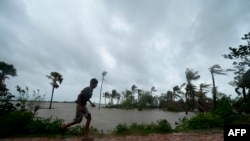Cyclone Amphan was downgraded to a tropical depression Wednesday but was still expected to drench parts of inland India and Bangladesh with heavy rain and flooding, damaging some of the weaker houses and buildings.
Amphan slammed into the eastern coast of India on Wednesday as the equivalent of a powerful Category 3 hurricane with sustained winds of 170 kph (105 mph). Some gusts reached 190 kph (118 mph).
Nearly 300,000 people were evacuated from West Bengal state and 150,000 from Odisha state, both in India.
Power was out across much of the region, so the official number of casualties was unknown. But at least two deaths were reported near Kolkata, India.
The storm struck while South Asia struggles with the coronavirus pandemic.
Children in peril
The U.N. children's fund (UNICEF) said the storm had put 19 million children at risk, not only from the direct effects of floods and wind damage but also from the potential spread of COVID-19 in crowded evacuation shelters.
“We continue to monitor the situation closely,” said Jean Gough, UNICEF regional director for South Asia. “The safety of children and their families in the areas that will be impacted is a priority, and it is good to see that the authorities have planned their urgent response factoring in the ongoing COVID-19 pandemic.”
Cyclone Amphan was causing additional misery for the hundreds of thousands of Rohingya refugees living in camps in Bangladesh and Myanmar, which have already reported a number of COVID-19 cases.
U Khine Myo Aung, the manager of one camp in Kyauktaw Township in Myanmar’s Rakhine state, told VOA’s Burmese service that the tents in which the refugees live provided little protection from the storm.
"The main challenge under the heavy rain for the refugee community is there's nowhere to sleep at night and [people are] moving here and there during daytime as well," he said. "Families with children squeeze in with neighbors, who have a roof.”
The manager of another camp, Ko Shwe So, told VOA the children and elderly were suffering most: “As camp manager, I would like to build proper accommodation for refugees, but no funds are available.”
Soaked in Bangladesh
In Bangladesh, conditions were no better.
“It has been raining heavily in our camp since early in the morning," a Rohingya refugee who uses the name Islam told VOA Burmese on Wednesday.
She lives in the Balukhali camp in Cox's Bazar and said volunteers had been spreading warnings about Cyclone Amphan throughout the camps.
"Our fellow refugees are exchanging phone messages about floods and landslides that occurred in some other camps," the former schoolteacher said.
VOA Burmese service stringers Zaw Htet and Thet Naing contributed to this report.





